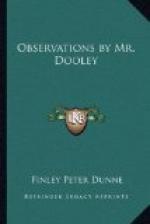“Sure, all that’s no news,” said Mr. Hennessy, discontentedly. “Hasn’t there annything happened? Hasn’t anny wan been—been kilt?”
“There ye ar-re,” said Mr. Dooley. “Be news ye mane misfortune. I suppose near ivry wan does. What’s wan man’s news is another man’s throubles. In these hot days, I’d like to see a pa-aper with nawthin’ in it but affectionate wives an’ loyal husbands an’ prosp’rous, smilin’ people an’ money in th’ bank an’ three a day. That’s what I’m lookin’ f’r in th’ hot weather.”
“Th’ newspapers have got to print what happens,” said Mr. Hennessy.
“No,” said Mr. Dooley, “they’ve got to print what’s diff’rent. Whiniver they begin to put headlines on happiness, contint, varchoo, an’ charity, I’ll know things is goin’ as wrong with this counthry as I think they ar-re ivry naytional campaign.”
The End of the War
“Why did th’ Boers quit fightin’?” asked Mr. Hennessy.
“Th’ supply iv British gin’rals give out,” said Mr. Dooley. “They were fin’lly crushed be th’ surrindher iv Gin’ral Lord Mechoon.
“Up to that time th’ British had niver gained anny important advantage. They’d surrindhered ninety or a hundherd thousan’ private sojery, thirty or forty colonels, near all th’ officers iv th’ guards, th’ Northumberland Fusileers over an’ over again, an’ Winston Churchill; they’d hurled gr-reat masses iv th’ Impeeryal Yeomanry into th’ prison camps iv th’ Boers; they’d surrindhered rifles, an’ ammunition an’ pompons an’ mules, but nary a British gin’ral among thim. Although a smaller foorce, Hinnissy, th’ Boers had th’ advantage iv knowin’ ivry foot iv th’ ground they were fightin’ on. Manny iv thim had just gone there, while th’ British had been on th’ ground f’r three years with an opporchunity to f’rget something ivry hour. Th’ crafty Dutch, marchin’ almost as well be bright moonlight as in th’ day time, proceedin’ without rest f’r hours at a time, always placin’ th’ catridge in th’ gun befure firm’, hardy, vigorous an’ accustomed to th’ veldt, had eluded all attempts to hand thim th’ roast beef iv Merry England in th’ shape iv a gin’ral.
“But whin Gin’ral, me Lord Kitchener, th’ Great Coon Conqueror, wint to South Africa, like th’ stern an’ remorseless warryor that he is, he detarmined to niver rest till he had desthroyed th’ inimy. In less thin two years, he had evolved his sthrategy. I will tell ye what it was, because ye’re inthrested in military plans. He spread his magnificent army iv gallant Britons out in a long line that sthretched clane acrost th’ counthry, wan yeoman deep. Thin, accompanied be his sub-gin’rals, he moved out in th’ followin’ ordher. I’ll dhraw it f’r ye, as I see it in th’ pa-aper. Here ye ar-re:
“The band,
“Gin’ral Lord Kitchener, K.C.B., K.N., K.L.K., G.K.R. (with medals),
“The other gin’rals,
“Pianos, Pianolas, Cottage Organs, Ping Pong Sets, Tennis Bats, Bridge Scores, Cricket Stumps, War Corryspondints,




